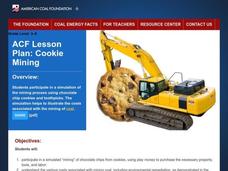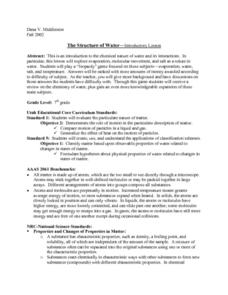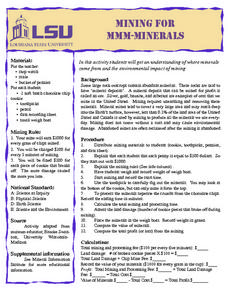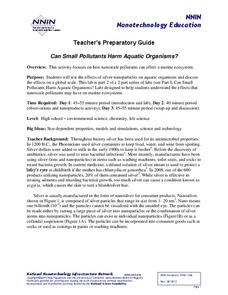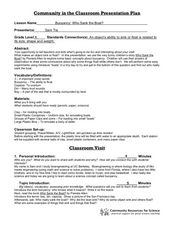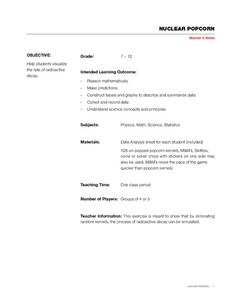Foundation for Water & Energy Education
How Can Work Be Done with Water Power? Activity C
Third in a set of lessons regarding reservoirs, dams, and hydropower, this involves a two-day hydropower plant simulation. Collaborative groups build, maintain, and finance the plant. The transparency of the reservoir setup can be...
Messenger Education
Mission: Possible—How Can We Plan an Exploration of Another World?
An astronaut's spacesuit weighs 280 pounds and takes 45 minutes to put on — that's a serious suit! The second activity of a three-part series allows pupils to see all that goes into space exploration. Through simulations, groups analyze...
Curated OER
Cookie Mining
Students simulate coal mining with chocolate chip cookies and toothpicks. They investigate the costs associated with mining coal.
Curated OER
Midnight Dumpers
Students explain how pollution affects ground water. They participate in a simulation to discover the location of an illegal dump. Students explore the monetary benefits, risk and environmental concerns are factors in business decisions.
Curated OER
Flipping Coins: Density as a Characteristic Property
Young scholars explore linear functions in a crime solving context. They collect and analyze data using linear equations, then interpret the slope and intercepts from a linear model.
Curated OER
Mining Simulation
Eighth graders put their knowledge of rocks and minerals into perspective by seeing how minerals can be mined and the difficulties and costs of mining. They explore the environmental impacts of mining.
Curated OER
Permit Trading
Emerging environmentalists work in groups and pretend that each is a power company generating electricity for a community. They consider the costs of building a renewable electricity generator that will increasingly replace generating...
Curated OER
Genetics of Parenthood
Young scholars participate in an activity where they flip coins to determine which allele they pass on to the F1 generation and draw the resulting child's face. They identify several inheritance patterns including dominant, recessive,...
Curated OER
World Population Activity II: Excel
Learners import UNEP World population data/projections from either the World Population Prospects: The 2002 Revision Population Database - UN Population Division or a text file. They graph this data by itself, and then along with...
Curated OER
Selection and Variation in the Egyptian Origami Bird
Students investigate genetics and evolution of species. They simulate the breeding of birds using origami birds. In addition, using dice they introduce genetic variation into the species.
Curated OER
Recycle Lifecycle
Students investigate the recycling process. In this recycling lesson, students read the article The Recycling Process After Collection and discuss the advantages of recycling. As an extension activity, students simulate the molding of...
Teach Engineering
Processes on Complex Networks
Introduces your class to random processes in networks with an activity that uses information about disease spread using the susceptible, infectious, resistant (SIR) model. Participants determine whether a susceptible person becomes...
Curated OER
The Chemical Nature of Water
Seventh graders simulate a Jeopardy game to examine the chemical nature of water. Among the topics featured are evaporation, water, salt, and temperature. finally, as review, 7th graders answer a battery of questions presented by the...
Curated OER
Using Radioactive Decay To Determine Age
Students explore the process of carbon dating fossils to determine their age. They simulate radioactive decay using pennies in a shoe box. Heads represents a decayed atom each time they shake the box. They use the data to calculate the...
Curated OER
Gone Fishin'
Students explore fishing and the food web. They simulate the role of fisherman using candy as fish and use provided materials to create a fishing device. Afterward, they complete data tables to organize the day's catch and report the...
Curated OER
Elements and Compounds
Middle schoolers explain how radioactive decay occurs. In this physical science lesson, students simulate radioactive half-life through an experiment. They graph their data and share their results in class.
Curated OER
Mining for Mmm-minerals
Young scholars explore minerals and examine environmental impact of mining through simulation.
National Nanotechnology Infrastructure Network
Can Small Pollutants Harm Aquatic Organisms?
Nanoparticles have toxic effects on plant and animal life—even though you can't see them. The second instructional activity of a two-part series has young scientists conduct an experiment that exposes plant and animals to nanoparticle...
Curated OER
Buoyancy: Who Sank the Boat?
Students examine whether objects will sink or float. In this buoyancy lesson students bring in objects and experiment to see if they sink or float.
National Museum of Nuclear Science & History
Nuclear Popcorn
Make your lesson on radioactive decay pop with this lab exercise. Using popcorn kernels spread over a tabletop, participants pick up all of those that point toward the back of the room, that is, those that represent decayed atoms. As the...
Curated OER
The Genetics of Parenthood
Students draws the child's face and compares "mother's" and "father's" perception of characteristics. One student draws the child's face; partner writes a biography of the child at age 30- what is the child like, what have they...
Curated OER
Who Did It?
Students explore how forensic science is used in criminal investigations. They learn that for the next few days that are going to try to solve a crime that took place in the classroom. Students are given a story to read about the crime...
Curated OER
Dig It Up
Students participate in an archaeological excavation to determine how archeologists make inferences about various cultures. They reconstruct the site using layers of drawings. They discuss the kinds of information they learned.
Curated OER
Finding an Earthquake's Epicenter
Young scholars examine the process used to identify the epicenter of an earthquake. They identify the Richter scale and interpret a seismograph reading. They also view photographs of the aftermath of earthquakes.




